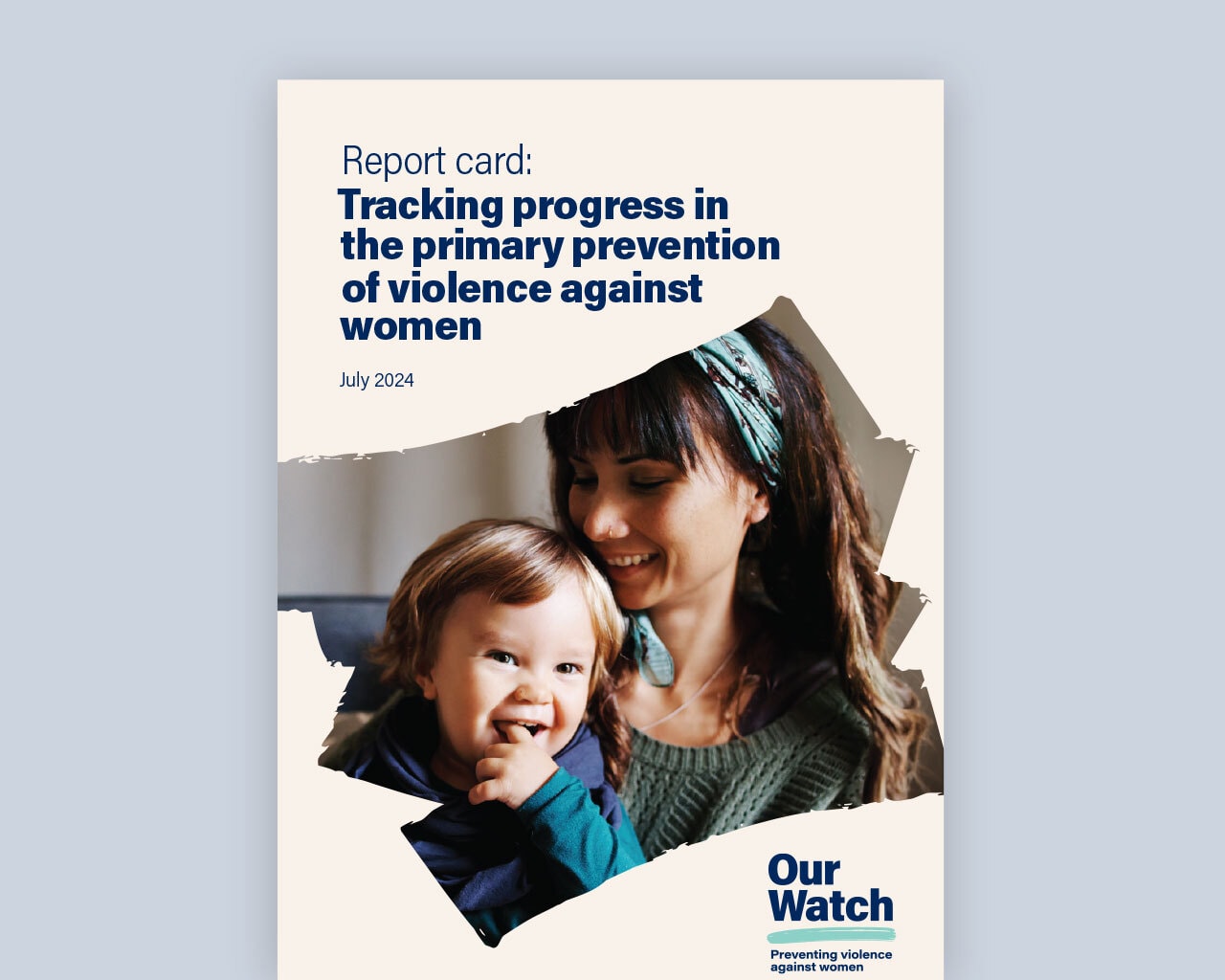On this page
A new report card has found that Australia’s efforts to prevent violence against women are having a positive impact on rates of violence.
The national tracker from Our Watch, the national organisation for preventing violence against women and their children, found a significant 66% decline in women killed by men’s violence over the past three decades, and a decline in the harmful attitudes that drive violence over the past 20 years.
Our Watch CEO Patty Kinnersly said the report card demonstrated that progress was being made in preventing violence against women, but much more work was needed.
“In a year where 43 women have been killed allegedly by men’s violence, it’s difficult to reconcile that we are making progress in ending this national crisis. But when we look at the longer-term picture we can see significant reductions in the number of women killed by men’s violence, reductions in women experiencing violence and improvements in community attitudes that reject and challenge this violence,” Ms Kinnersly said.
“These are positive changes, but zero is the only acceptable number of gender-based homicides and there is still significant work to do if we want to see violence against women rapidly decline.”

Report card: Tracking progress in the primary prevention of violence against women
The report card found:
- significant reductions in the proportion of women experiencing physical violence in the previous 12 months from all perpetrators including intimate partners, since 2012
- significant improvements in Australians’ understanding of violence against women, attitudes rejecting gender inequality, and attitudes rejecting sexual violence between 2013 to 2021 (most recent data)
- a 13% decline in young men supporting harmful ideas of masculinity over the last five years
- a decline from 49% to 37% in young men feeling pressure to conform to rigid ideals of masculinity over the last five years
- a plateau in attitudes rejecting domestic violence between 2017 to 2021
- an increase in sexual violence between 2012-2017 with no significant change since.
Ms Kinnersly said the decline in young men feeling pressure to conform to rigid ideals of masculinity showed positive momentum in challenging the harmful cultures of masculinity that can drive violence against women.
“We know from recent research that men who hold rigid and harmful ideals of masculinity, like that men should use violence to get respect, are 17 times more likely to have hit an intimate partner compared to men who hold healthier views of what it is to be a man,” Ms Kinnersly said.
“This demonstrates the connection between attitudes and behaviour, and the importance of showing young men that there’s more than one way to be a man.”
The Report card: Tracking progress in the primary prevention of violence against womenalso showed an increase in reporting of violence against women to authorities – an indicator of positive change in community understanding of violence and victim-survivors feeling safe to report it.
“It’s also promising to see improvements in community understanding of violence against women is leading to more women feeling they can report these crimes to police. We expect that police reporting of gendered violence will continue to rise as more women feel supported and believed when they come forward,” Ms Kinnersly said.
This latest report shows that while some of the structural and policy changes needed to prevent violence against women have been made, much of this change is in its infancy.
“While we’ve seen significant steps towards building the foundations required to prevent violence against women, in many ways primary prevention is still new,” Ms Kinnersly said.
“For example, New South Wales has only this year released a funded primary prevention strategy and Victoria is still the only state providing whole-of-school respectful relationships education.
“This is much more than just changing attitudes – it is about building a more equal society, and we have more work to do to create the structural, legislative and policy change required to end this crisis.”
The report is being released ahead of a new Our Watch paper which outlines the priority actions that are needed to prevent and end violence against women. Among the recommendations:
- Establish, develop, support and grow a national primary prevention workforce. This workforce is the cornerstone to implementing prevention activities at the scale and level of saturation that is needed across the country to drive change.
- Fund a comprehensive national perpetration study. This would help us better understand the characteristics of perpetrators and enable more effective targeting of prevention strategies. This will build on a current NSW study underway.
- Fund and implement Respectful Relationships Education in every school in Australia (currently it this is only in Victorian schools).
- Develop initiative ways to engage and equip men and boys with the critical thinking skills that can help them reject misogynistic influencers and content, particularly in the online 'manosphere'.
- Improved strategies to address the range of ‘reinforcing factors’ that can make violence against women more likely or more severe. This includes early intervention and healing strategies that respond to childhood exposure to violence; and measures to limit harmful alcohol consumption by men when in male dominated group settings.
Media contact
Please contact media@ourwatch.org.au or call 0448 844 930.
If you cover this story, or any story regarding violence against women and children, please include the following tagline:
1800RESPECT is the national domestic, family, and sexual violence counselling, information and support service. If you or someone you know is experiencing, or at risk of experiencing, domestic, family or sexual violence, call 1800RESPECT on 1800 737 732, chat online via www.1800RESPECT.org.au, or text 0458 737 732. Men’s Referral Service: 1300 766 491
Access guides for reporting about violence against women and their children.
Our Watch
Our Watch is a national leader in Australia’s work to stop violence against women and their children before it starts. The organisation was created to drive nation-wide change in the practices, norms, and structures that lead to violence against women and children. Read more about Our Watch here.